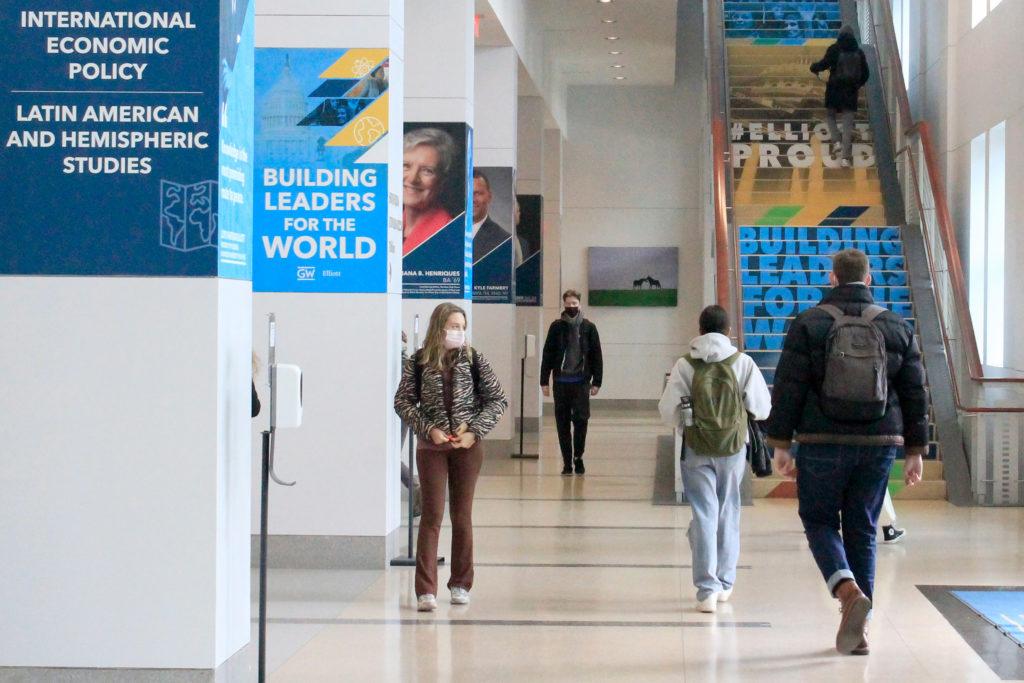Updated: April 4, 2022 at 4:30 p.m.
A national security consortium of D.C. college students shifted to in-person operations to host events across the city and publish student research on how gender discrimination impacts security policy since its launch last spring.
Students in the Elliott School of International Affairs established the D.C. Student Consortium on Women, Peace and Security last year for students in the District to focus their research on expanding gender inclusivity in foreign policy and advocate for gender-inclusive courses in their schools. Students and consortium organizers said the group has held panel discussions with national security experts, weekly meetings and networking events this year to research how security policies discriminate against different genders, where men have historically dominated the field.
Organizers said about 30 members make up the consortium, most of whom are in the Elliott School. She said the consortium has official chapters at GW and Georgetown universities but also hosted events with Howard University during the past year.
Taylor Bloch, a senior studying international affairs and the director of programming for the consortium, said the group held its first in-person event for International Women’s Day last month, which featured keynote speaker Muqaddesa Yourish, a professor of international affairs. She said Yourish discussed how U.S. foreign policy overlooks gender-based needs in other countries at the event, which drew about 150 attendees.
“I think we really succeeded in creating that safe space and creating dialogue for these voices who often are not heard within the Elliott School,” Bloch said.
Bloch said she has primarily studied the works of cisgender, white and heterosexual men in courses taught by white male professors in the Elliott School like U.S. Foreign Policy and U.S. Diplomatic History. She said the lack of diverse Elliott School faculty in required coursework is a “disservice” to all students and should include a variety of diverse scholarship and faculty to increase students’ diversity exposure.
Three out of four professors teaching U.S. Foreign Policy and U.S. Diplomatic History this semester identify as male, according to the Schedule of Classes. Officials in the Elliott School introduced plans to diversify the school’s curricula, faculty and student body as part of the Inclusive Excellence Initiative launched this fall.
Bloch said graduate students in the consortium who have full-time jobs in international affairs research and policy provide consortium undergraduates “unique access” to the international affairs field with mentorship opportunities.
“In comparison to other student organizations I’ve been involved with, we really have any mentorship regardless of who you are,” Bloch said. “We’re constantly learning from each other.”
Shirley Graham, the director of the Elliott School’s Gender Equality Initiative in International Affairs and the faculty mentor of the consortium, said conversations around gender inclusion in national security organizations have lacked youth perspective because they tend to only include adult policymakers.
“We were really missing an opportunity to engage with younger generations of scholars and students if we didn’t include their research, their perspectives, their voices and their ideas,” Graham said.
Rachel Yakobashvili, the director of social media for the consortium and a second-year graduate student studying public administration, said she invited students at the Georgetown consortium chapter to virtual and in-person national security events to build collaborative connections with D.C.’s other chapters. She said the two chapters advocate for classes in the Elliott School and Georgetown’s Edmund A. Walsh School of Foreign Service that involve women in peace and security studies.
“We want to diversify the course load for the Elliott School to allow people to take more classes that integrate gender lenses and international affairs,” Yakobashvili said.
Yakobashvili said the consortium is starting to create more independent research opportunities for members to publish their research on feminist foreign policy on their website. She said the organization’s undergraduate membership increased this year, and she wants students to discuss a variety of issues that affect women, like sexual violence, to inform them about on-campus resources.
“We realize that a lot of people don’t know what resources are available, or if they do know something like, for example, the Title IX Office, it has mixed reviews,” Yakobashvili said. “And so knowing your options is always important.”
Junior Ramani Wilson, the director of outreach and advocacy for the consortium, said Georgetown established a chapter last year, and she sought to increase diversity within the consortium through the establishment of more chapters at D.C. universities like Howard University. She said she co-hosted a virtual panel discussion in February with Howard’s Center for Women, Gender and Global Leadership to discuss diversifying the United Nations Security Council’s women, peace and security agenda, which the consortium uses as a framework for its research.
“We’ve been doing a lot of work to make sure that we are promoting gender inclusive courses and even within the representation from faculty,” Wilson said.
Wilson said her goal to increase diversity in the consortium as a person of color led her to take a “leap of faith” and run for a leadership role earlier this year, an action she encourages underclassmen of color in the organization to replicate.
“I didn’t think that they were going to vote me in, but I knew what I could contribute to the role and I knew certain goals that I had,” Wilson said. “I wanted to make sure that I saw people that look like me within the organization.”
This post was updated to correct the following:
The Hatchet incorrectly reported that the national security consortium is made of D.C. female college students. The consortium is open to all students. The Hatchet also incorrectly reported that Yakobashvili is studying international affairs. She is studying public administration. We regret these errors.







